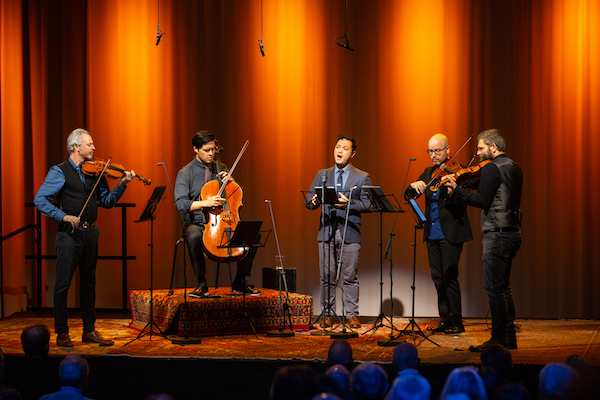A memorable night of contemporary song from Nicholas Phan, Brooklyn Rider

Tenor Nicholas Phan performed with Brooklyn Rider Friday night at Calderwood Hall. Photo: Robert Torres
The string quartet Brooklyn Rider continued its season-long Celebrity Series residency Friday night at GBH’s Calderwood Studio. For this second of their three-concert series, the group was joined by the excellent tenor Nicholas Phan in what Rider violinist Colin Jacobsen described as a “celebration of song.”
The ensemble approached this theme creatively, anchoring it in Franz Schubert’s String Quartet in D minor “Death and the Maiden” (so called because its second-movement variations are based on that composer’s eponymous lied). Before the Schubert, Phan offered a series of vocal selections by Thomas Campion, Rufus Wainwright, and Nico Muhly.
In Campion’s “Never weather-beaten sail,” a hymn extolling the joys of Heaven, Phan delivered his part with an affecting purity of tone and precise diction. The quartet reveled in the accompaniment’s subtleties, from the beautiful, glassy introduction to the delicate, widely-spaced sonorities in the second verse.
Jacobsen’s arrangement of Wainwright’s Trois valses anglaises, was heard its local premiere. The three movements set texts by the acclaimed singer-songwriter that are, generally, wistful in character. As the title suggests, all dance to one degree or another.
In the opening number, “Watching the monarchs come in,” a gently tripping vocal line floats over undulating violin-and-viola accompaniments. Nervously pulsing figures frame lyrical passages in the central “Friend in common,” while the bold climax of the concluding “Listen to the queen” unwinds into a haunting final cadence.
Phan proved an ideal advocate for this piece. Of course, he was aided by Wainwright’s utterly natural text settings. But the singer’s ability to evince the bittersweet essence of each song was remarkable, as was his effortless projection in the exposed, upper register moments.
Muhly’s song cycle, Stranger, is a work “about immigration and how we welcome people into the country…or we don’t,” as Phan put it in introductory remarks. This potent essay of seven movements sets prose passages that largely focus on the experiences of ethnic minorities coming to the United States, particularly those of Chinese, Italian, and Jewish descent. Excerpts of letters from individuals are juxtaposed with the biblical injunction, so often ignored, to love and respect “the stranger that dwelleth among you.”
Muhly’s settings mix a recitative-like style with a melodic sensibility that most closely mirrors the John Adams of Doctor Atomic and The Passion According to the Other Mary. All of it, especially the high tessitura writing, is tailor-made for Phan’s instrument.
In this Boston premiere, Stranger proved riveting Friday night, and Phan sang his part with fervor. Indeed, the intensity with which he delivered the music’s century-old (but, evidently, ageless) observations of Christian hypocrisy and abject racial bias was made all the more powerful by his discreet underlining of the common humanity shared by these diverse writers: concerns for health, enjoyment of food, love for spouses and children are, after all, universal.
Brooklyn Rider deftly navigated Muhly’s idiomatic blend of pungent harmonic progressions, slashing attacks, and dashes of shimmering stasis. Throughout, the group also matched Phan in concentration and zeal, nowhere more so than in the radiant finale, which sets a tender 1945 letter from a war bride to her husband.
After this, Schubert’s 1824 quartet offered something of an emotional release. Brooklyn Rider’s was a taut and focused— but also songful—account of this much-loved piece. The first movement was smartly driven, its counterpoint carefully balanced, and its explosive episodes just as energetically packed as the quiet, introspective ones.
The melodic line was flawlessly sculpted in the second section. There was a real sense of dramatic progression across its five variations, from cellist Michael Nicolas’s melting solos in the second to the group’s kinetic alternations of abandon and restraint in the last.
Bold contrasts of rhythm and tone marked the snapping Scherzo while the finale’s galloping tattoos and heroic refrains were countered by jittery fiddle lines, spastic ensemble outbursts, and unsettling silences.
Taken together, this made for a gripping Schubert interpretation, as intense and memorable as the Muhly premiere.
The Celebrity Series presents pianist Conrad Tao performing music by John Adams, Jason Eckhardt, J. S. Bach, Robert Schumann, Ludwig van Beethoven, and Conrad Tao at 8 p.m. on December 1 at Pickman Hall. celebrityseries.org; 617-482-6661
Posted in Performances




